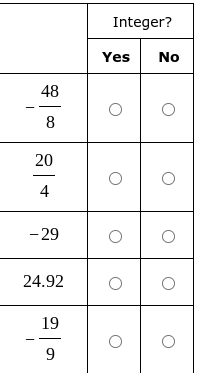Determine if the results of the following divisions are integers: 48 ÷ 8, 20 ÷ 4, -29, 24.92, and 19 ÷ 9.

Understand the Problem
The question involves determining whether the results of several division operations yield integers or not. Each computation will need to be executed, and the outcome classified as either 'Yes' or 'No' based on whether the result is an integer.
Answer
Yes, Yes, Yes, No, No
Answer for screen readers
- 48 ÷ 8: Yes
- 20 ÷ 4: Yes
- -29 ÷ 1: Yes
- 24.92: No
- 19 ÷ 9: No
Steps to Solve
- Divide 48 by 8
Calculate the result of $48 \div 8$.
$$ 48 \div 8 = 6 $$
Since 6 is an integer, the answer is 'Yes'.
- Divide 20 by 4
Now calculate $20 \div 4$.
$$ 20 \div 4 = 5 $$
Since 5 is an integer, the answer is 'Yes'.
- Divide -29 by 1
Here, we compute $-29 \div 1$.
$$ -29 \div 1 = -29 $$
Since -29 is an integer, the answer is 'Yes'.
- Check if 24.92 is an integer
24.92 is a decimal number. Decimal numbers can never be integers, so the answer is 'No'.
- Divide 19 by 9
Calculate $19 \div 9$.
$$ 19 \div 9 \approx 2.11 $$
Since 2.11 is not an integer, the answer is 'No'.
- 48 ÷ 8: Yes
- 20 ÷ 4: Yes
- -29 ÷ 1: Yes
- 24.92: No
- 19 ÷ 9: No
More Information
The integers are whole numbers that can be positive, negative, or zero. A number is an integer if it does not have a fractional component. Dividing integers might yield integers or decimals, depending on the operation.
Tips
- Confusing decimals with integers: Remember that decimals (like 24.92) are not integers.
- Forgetting to check the signs of the numbers: Division can yield negative integers.
AI-generated content may contain errors. Please verify critical information